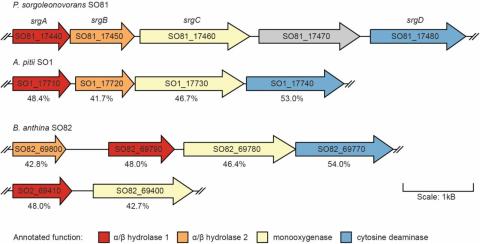Metabolite exchange between plant roots and their associated rhizosphere microbiomes underpins plant growth promotion by microbes. Sorghum bicolor is a cereal crop that feeds animals and humans and is used for bioethanol production. Its root tips exude large amounts of a lipophilic benzoquinone called sorgoleone. Sorgoleone is an allelochemical that suppresses the growth of competing plant seedlings and is mineralized by microbes in soil. As an avenue to understand how sorghum and its root microbiome may be connected through root exudates, we identified the molecular determinants of microbial sorgoleone degradation and the distribution of this trait among microbes. We isolated and studied from sorghum-associated soils, three bacterial strains classified as Acinetobacter, Burkholderia, and Pseudomonas species that grow with sorgoleone as a sole carbon and energy source. The discovery of bacteria that grow on a compound like sorgoleone that is plant specific and not widely distributed in the environment, provides an opportunity to study how a plant exudate can enforce the development of a rhizosphere specific microbiome for the mutual benefit of plant and microbe.
Reference Citation
Sorgoleone degradation by sorghum-associated bacteria; an opportunity for enforcing plant growth promotion. Yasuhiro Oda, Joshua R. Elmore, William C. Nelson, Andrew Wilson, Yuliya Farris, Ritu Shrestha, Citlali Fonseca Garcia, Dean Pettinga, Aaron J. Ogden, Henri Baldino, William G. Alexander, Adam M Deutschbauer, Catalina Vega Hurtado, Jason E. McDermott, Adam M. Guss, Devin Coleman-Derr, Ryan McClure, Caroline S. Harwood, Robert G. Egbert. bioRxiv. 2023.05.26.542311; doi: https://doi.org/10.1101/2023.05.26.542311
Projects (1)
Last updated on 2023-02-23T19:37:46+00:00 by LN Anderson PerCon SFA Project Publication Experimental Data Catalog The Persistence Control of Engineered Functions in Complex Soil Microbiomes Project (PerCon SFA) at Pacific Northwest National Laboratory ( PNNL ) is a Genomic Sciences Program...
Datasets
5









